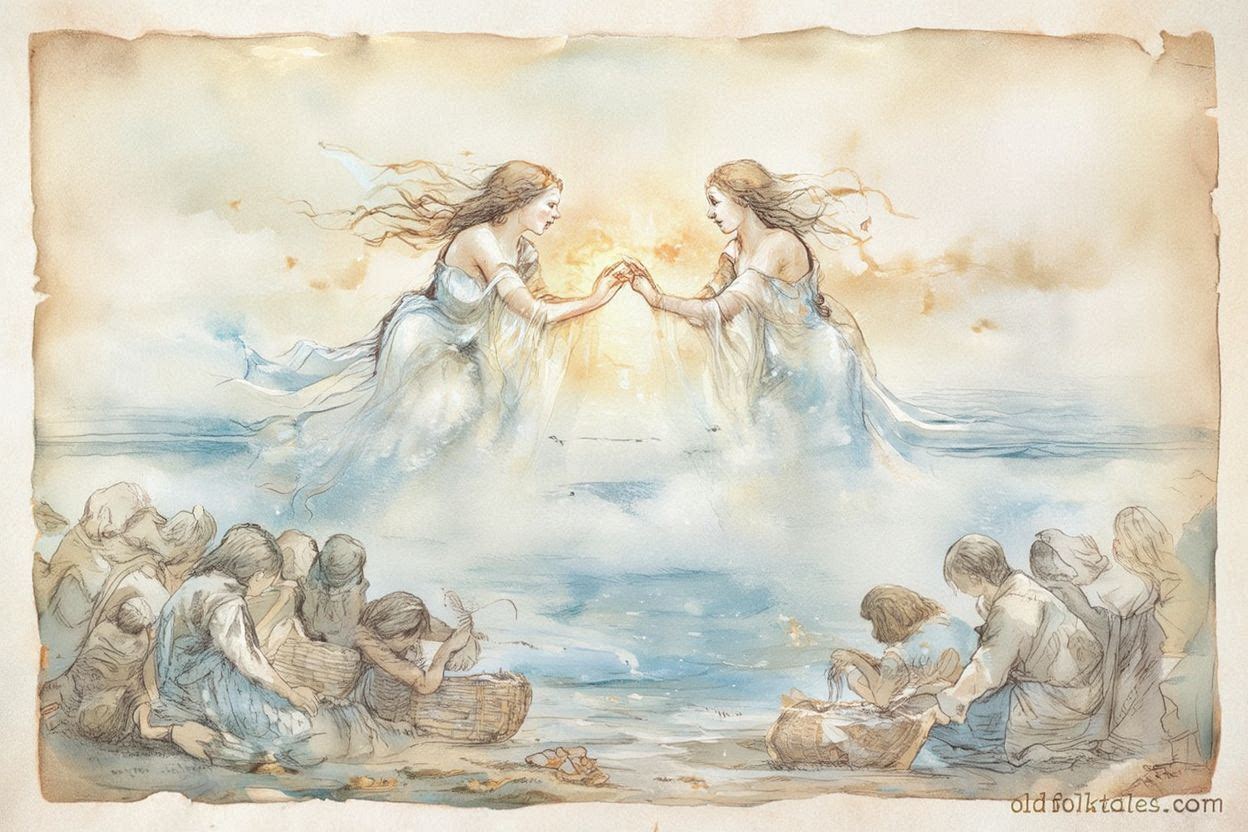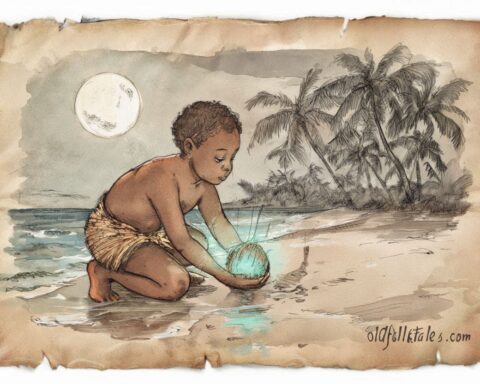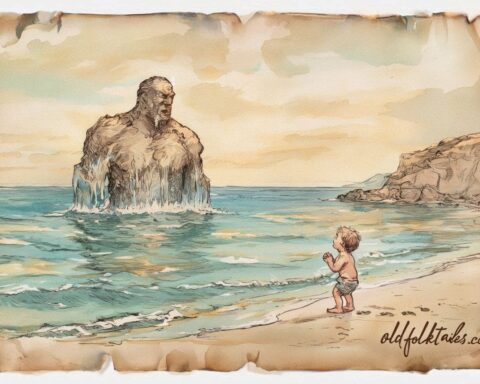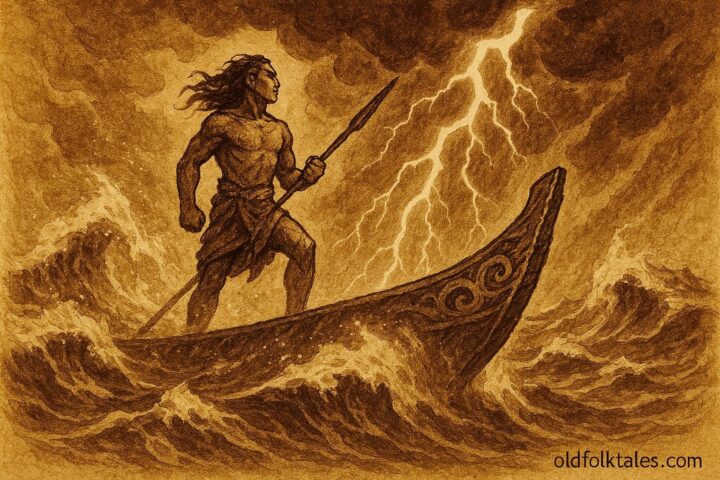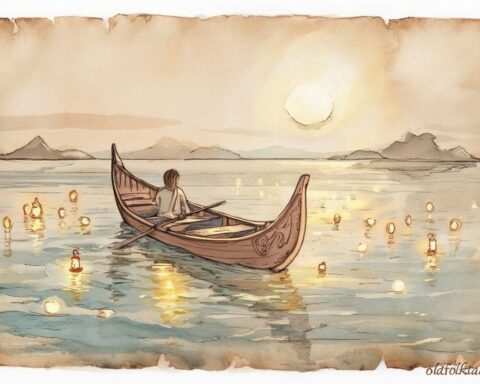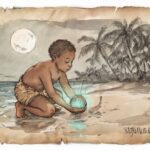Long ago, before the islands of Kiribati were shaped as they are today, the land and the sea were living beings with spirits as powerful as the gods. The spirit of the land, Nei Matang, was steadfast and nurturing. She gave roots to trees, firm soil for houses, and space for families to grow. The spirit of the sea, Nei Moana, was ever-moving and generous, giving fish, cool winds, and paths for the canoes.
For countless ages, they lived as sisters different yet united, holding the world together in harmony. The tides came and went like the slow breathing of the earth, and the people of the islands lived in peace, guided by the wisdom of both spirits. Every season, they offered gifts of taro and coconuts to the land and fish and shells to the sea. In this way, balance was kept.
But in time, people forgot. As generations passed, the old chants faded, and the offerings grew fewer. They built too close to the shore, dug up sacred stones, and threw waste into the lagoons. Fishermen took more than they needed, ignoring the days of rest that the elders once declared sacred. The land became dry and weary, the coral began to fade, and the waves whispered warnings that few would hear.
One night, as the moon rose full and heavy over Tarawa, Nei Moana stirred in her deep palace beneath the waves. Her eyes glowed with the color of the sea at dawn, and her voice rolled like thunder beneath the reef.
“Sister,” she called out to Nei Matang, “your people have forgotten the old laws. They take without thanks and wound without care. The tides no longer sing my name.”
Nei Matang sighed, her breath rustling the palm leaves across the atoll. “I have spoken through the trees, through the drought and the cracking soil, but they do not listen. Their hearts are full of greed.”
“Then I must remind them,” said Nei Moana, and her anger swelled like a storm. The waves began to rise, higher and higher, until the people woke to find the sea swallowing the edges of their villages. Coconuts floated like lost stars upon the water.
Fear spread through the island. The elders gathered, their voices trembling. “The sea is angry,” they said. “We have broken the balance.” They remembered the old songs that had not been sung for generations, the words that once bound the land and sea in peace.
The people built a great altar of coral and sand near the shore. They placed offerings of breadfruit, shells, and woven mats upon it. The women sang prayers to Nei Matang, asking her to intercede. The men stood in silence, heads bowed, as they cast baskets of fish back into the water, hoping the sea would forgive them.
For three days and nights the sea raged. Lightning danced on the horizon, and the rain poured like tears of the gods. Then, on the fourth morning, the wind softened, and the waves began to fall back. From the quiet lagoon rose a gentle mist, and within it appeared the figures of Nei Matang and Nei Moana.
The people fell to their knees. The spirits looked upon them with sorrow and grace.
“You forgot the sacred order,” said Nei Matang, her voice deep as the roots of the trees. “You took from the land without giving.”
“And from the sea,” said Nei Moana, “you took without respect. But you have remembered now.”
The two spirits joined hands, and light spread between them, turning the mist into colors that shimmered like fish scales. “The balance is restored,” they said together. “Remember that neither land nor sea can live without the other. When you honor both, life will flourish. When you forget, the waters will rise again.”
From that day forward, the people of Kiribati renewed their customs. They set aside seasons of rest for fishing and planting. They taught their children to give thanks before taking from the land or the sea. The elders composed new songs to honor Nei Matang and Nei Moana, sung each dawn as fishermen pushed their canoes into the gentle surf.
The story was carved into wooden boards and told by the fireside, reminding all who listened that harmony is fragile, and the gifts of the world are not endless. Even today, when storms approach the islands, the people whisper prayers to the sea and touch the earth in reverence, remembering the sisters who keep the world in balance.
Moral Lesson
The tale of Nei Matang and Nei Moana teaches that the land and sea exist in sacred partnership. Humanity’s survival depends on respect for nature’s balance. When we live with gratitude and restraint, the world remains whole and peaceful.
Knowledge Check
1. Who are Nei Matang and Nei Moana in the story?
They are the spirits of the land and the sea who maintain the balance of the world.
2. What caused the sea to rise and flood the land?
The people disrespected the sacred laws by harming nature and neglecting offerings.
3. How did the people restore peace with the spirits?
They made offerings, sang sacred songs, and asked forgiveness from the sea and the land.
4. What lesson does the story teach about human behavior?
That greed and disrespect for nature destroy balance, while humility restores harmony.
5. How did the people honor the spirits after the flood?
They created new songs and customs to honor both the land and the sea.
6. What do the sisters Nei Matang and Nei Moana symbolize?
They symbolize the interdependence between earth and ocean, and the importance of balance.
Source: Adapted from Kiribati Environmental Myths and Sacred Geography by the National Museum of Kiribati (2012).
Cultural Origin: Kiribati (Micronesia)
